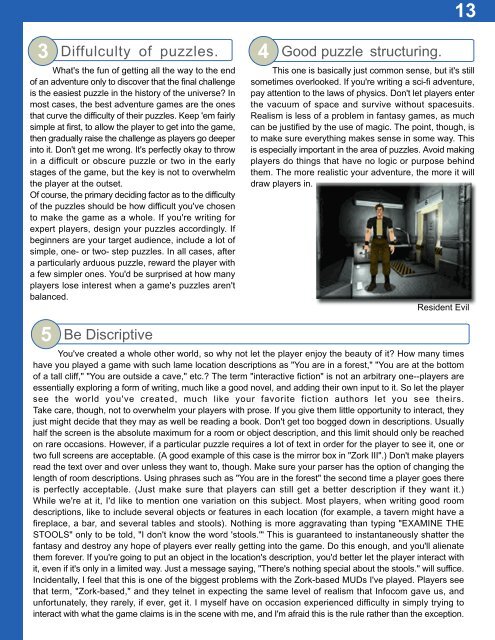Create successful ePaper yourself
Turn your PDF publications into a flip-book with our unique Google optimized e-Paper software.
3<br />
Diffulculty of puzzles.<br />
What's the fun of getting all the way to the end<br />
of an adventure only to discover that the final challenge<br />
is the easiest puzzle in the history of the universe? In<br />
most cases, the best adventure games are the ones<br />
that curve the difficulty of their puzzles. Keep 'em fairly<br />
simple at first, to allow the player to get into the game,<br />
then gradually raise the challenge as players go deeper<br />
into it. Don't get me wrong. It's perfectly okay to throw<br />
in a difficult or obscure puzzle or two in the early<br />
stages of the game, but the key is not to overwhelm<br />
the player at the outset.<br />
Of course, the primary deciding factor as to the difficulty<br />
of the puzzles should be how difficult you've chosen<br />
to make the game as a whole. If you're writing for<br />
expert players, design your puzzles accordingly. If<br />
beginners are your target audience, include a lot of<br />
simple, one- or two- step puzzles. In all cases, after<br />
a particularly arduous puzzle, reward the player with<br />
a few simpler ones. You'd be surprised at how many<br />
players lose interest when a game's puzzles aren't<br />
balanced.<br />
5<br />
Be Discriptive<br />
4<br />
Good puzzle structuring.<br />
13<br />
This one is basically just common sense, but it's still<br />
sometimes overlooked. If you're writing a sci-fi adventure,<br />
pay attention to the laws of physics. Don't let players enter<br />
the vacuum of space and survive without spacesuits.<br />
Realism is less of a problem in fantasy games, as much<br />
can be justified by the use of magic. The point, though, is<br />
to make sure everything makes sense in some way. This<br />
is especially important in the area of puzzles. Avoid making<br />
players do things that have no logic or purpose behind<br />
them. The more realistic your adventure, the more it will<br />
draw players in.<br />
Resident Evil<br />
You've created a whole other world, so why not let the player enjoy the beauty of it? How many times<br />
have you played a game with such lame location descriptions as "You are in a forest," "You are at the bottom<br />
of a tall cliff," "You are outside a cave," etc.? The term "interactive fiction" is not an arbitrary one--players are<br />
essentially exploring a form of writing, much like a good novel, and adding their own input to it. So let the player<br />
see the world you've created, much like your favorite fiction authors let you see theirs.<br />
Take care, though, not to overwhelm your players with prose. If you give them little opportunity to interact, they<br />
just might decide that they may as well be reading a book. Don't get too bogged down in descriptions. Usually<br />
half the screen is the absolute maximum for a room or object description, and this limit should only be reached<br />
on rare occasions. However, if a particular puzzle requires a lot of text in order for the player to see it, one or<br />
two full screens are acceptable. (A good example of this case is the mirror box in "Zork III".) Don't make players<br />
read the text over and over unless they want to, though. Make sure your parser has the option of changing the<br />
length of room descriptions. Using phrases such as "You are in the forest" the second time a player goes there<br />
is perfectly acceptable. (Just make sure that players can still get a better description if they want it.)<br />
While we're at it, I'd like to mention one variation on this subject. Most players, when writing good room<br />
descriptions, like to include several objects or features in each location (for example, a tavern might have a<br />
fireplace, a bar, and several tables and stools). Nothing is more aggravating than typing "EXAMINE THE<br />
STOOLS" only to be told, "I don't know the word 'stools.'" This is guaranteed to instantaneously shatter the<br />
fantasy and destroy any hope of players ever really getting into the game. Do this enough, and you'll alienate<br />
them forever. If you're going to put an object in the location's description, you'd better let the player interact with<br />
it, even if it's only in a limited way. Just a message saying, "There's nothing special about the stools." will suffice.<br />
Incidentally, I feel that this is one of the biggest problems with the Zork-based MUDs I've played. Players see<br />
that term, "Zork-based," and they telnet in expecting the same level of realism that Infocom gave us, and<br />
unfortunately, they rarely, if ever, get it. I myself have on occasion experienced difficulty in simply trying to<br />
interact with what the game claims is in the scene with me, and I'm afraid this is the rule rather than the exception.


